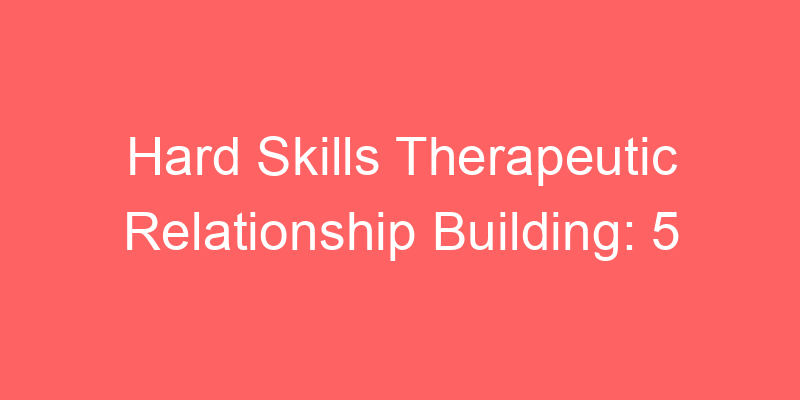Top 5 Hard Skills for Therapeutic Relationship Building in Your Resume
When applying for jobs in counseling, therapy, or healthcare, showcasing the right hard skills for therapeutic relationship building can set you apart. Employers seek professionals who not only have empathy but also possess concrete, measurable skills that strengthen patient trust and engagement.
Including these skills in your resume and cover letter can significantly increase your chances of landing an interview. In this guide, we’ll explore the top hard skills that demonstrate your ability to build strong therapeutic relationships and how to effectively highlight them in your job application.
What Are Hard Skills for Therapeutic Relationship Building?
Unlike soft skills, which involve personality traits and interpersonal abilities, hard skills are teachable, measurable, and often require formal training or certification. In the field of therapy and healthcare, these skills directly impact the quality of patient care and trust.
Some key hard skills in therapeutic relationship building include:
- Active Listening Techniques
- Behavioral Assessment and Diagnosis
- Clinical Documentation and Record-Keeping
- Evidence-Based Therapeutic Techniques
- Crisis Intervention Strategies
Now, let’s dive deeper into each of these skills and how you can effectively present them in your resume.
1. Active Listening Techniques
Active listening is a fundamental skill for building trust with clients. It involves fully concentrating, understanding, and responding to what the patient is saying. Mastering active listening helps therapists validate emotions, clarify concerns, and create a safe environment for open communication.
How to Showcase This in Your Resume
- Example for Resume: “Utilized active listening techniques, including paraphrasing and reflective questioning, to improve patient engagement and treatment outcomes.”
- Example for Cover Letter: “In my previous role, I implemented active listening strategies to strengthen rapport with patients, leading to a 30% improvement in treatment adherence.”
2. Behavioral Assessment and Diagnosis
Being able to assess and diagnose behavioral conditions is a critical skill in therapeutic professions. This requires knowledge of standardized diagnostic tools, psychological evaluations, and data interpretation to create effective treatment plans.
How to Showcase This in Your Resume
- Example for Resume: “Conducted comprehensive behavioral assessments using DSM-5 criteria, leading to accurate diagnoses and personalized treatment strategies.”
- Example for Cover Letter: “My expertise in psychological assessment allowed me to diagnose and tailor interventions that resulted in improved patient progress and well-being.”
3. Clinical Documentation and Record-Keeping
Proper documentation is essential for ensuring legal compliance, maintaining patient confidentiality, and tracking treatment progress. This skill involves accurately recording case notes, treatment plans, and progress reports in a professional manner.
How to Showcase This in Your Resume
- Example for Resume: “Maintained detailed clinical records using electronic health record (EHR) systems, ensuring compliance with HIPAA and institutional policies.”
- Example for Cover Letter: “My proficiency in clinical documentation has helped improve communication among multidisciplinary teams, enhancing patient care efficiency.”
4. Evidence-Based Therapeutic Techniques
Therapists must be trained in various evidence-based interventions, such as Cognitive Behavioral Therapy (CBT), Dialectical Behavior Therapy (DBT), or Motivational Interviewing (MI). These approaches are backed by research and improve treatment success rates.
How to Showcase This in Your Resume
- Example for Resume: “Specialized in Cognitive Behavioral Therapy (CBT) to help clients develop coping mechanisms and achieve measurable progress.”
- Example for Cover Letter: “By incorporating evidence-based interventions such as DBT, I have helped clients achieve greater emotional regulation and long-term behavioral change.”
5. Crisis Intervention Strategies
Handling mental health crises requires specialized training in de-escalation, suicide prevention, and emergency response. This skill is crucial for professionals working in hospitals, rehabilitation centers, or community outreach programs.
How to Showcase This in Your Resume
- Example for Resume: “Provided crisis intervention support, including suicide risk assessment and safety planning, reducing emergency hospitalizations by 25%.”
- Example for Cover Letter: “My expertise in crisis management has allowed me to respond effectively to emergency situations, ensuring patient safety and stability.”
How to Effectively Highlight These Skills in Your Job Application
Now that you understand the key hard skills for therapeutic relationship building, it’s important to present them strategically in your resume and cover letter.
Resume Formatting Tips
- Use a dedicated “Skills” section to list technical competencies.
- Incorporate skills into job descriptions with specific examples and achievements.
- Use bullet points to improve readability and impact.
Cover Letter Best Practices
- Explain how your skills have led to measurable improvements in patient care.
- Provide real-world examples to showcase your expertise.
- Demonstrate how your skills align with the employer’s needs.
Final Thoughts
Building strong therapeutic relationships requires more than just empathy—it demands specialized knowledge and technical expertise. Highlighting the right hard skills for therapeutic relationship building in your resume can demonstrate your ability to foster trust, improve patient outcomes, and excel in your field.
By effectively showcasing skills such as active listening, behavioral assessment, clinical documentation, evidence-based interventions, and crisis intervention, you can position yourself as a top candidate in the competitive job market.
Take the time to tailor your resume and cover letter, integrating these key skills in a way that highlights your professional value. Doing so will increase your chances of landing your ideal role and making a meaningful impact in the lives of your clients.
Generate Your NEXT Resume with AI
Accelerate your resume crafting with the AI Resume Builder. Create personalized resume summaries in seconds.
Search Results for: hard skills therapeutic relationship building
Hard Skills Therapeutic Relationship Building: 5 Key Job-Ready Techniques 2025
Hard skills therapeutic relationship building is essential for career success. Learn five key techniques to enhance your job-ready skills in 2025.
Hard Skills Therapeutic Exercise for Job Seekers: 5 Key Benefits in 2025
Hard Skills Therapeutic Exercise for Job Seekers helps boost physical health and mental clarity, essential for career success. Learn more about this unique advantage.
Resume Example Behavioral Health Coach: 5 Tips for Crafting a Standout Resume
Learn how to create a compelling resume as a behavioral health coach with these 5 essential tips. Improve your job search in 2025 with a standout resume.




